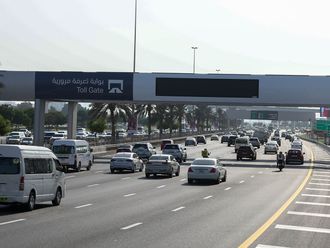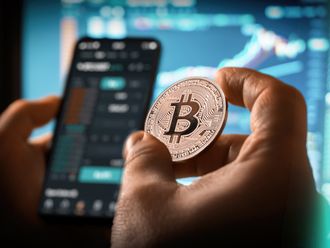
Nestled amid mountains and beaches and with a much happening nightlife, Beirut is a well-known tourist destination. Lately though, the Lebanese stocks on the Beirut stock exchange have been attracting increasing attention from foreign investors.
Just last week the emerging markets investor, Mark Mobius of Templeton Asset Management visiting the city on the invitation of a bank spoke about his interest in investing in some of the companies.
He, however, declined to give names of companies in which he was considering buying stakes.
In the universe of Lebanon's asset classes, equities have been less talked about. It is not hard to fathom why. Bank term deposits and government Treasury bills have over the last few years been among the most favoured. Eurobonds issued by banks have been another hot option for investors, both inside and outside.
"Lebanese banks have been paying 200 to 300 basis points more on dollar deposits and some 500 basis points or even more on Lebanese pound deposits than what you would get on equivalent deposits in the Gulf," says Nasser Saidi, chief economist of Dubai International Financial Centre. "And this has sucked in enormous capital into Lebanon and built up the Central Bank's reserves as well as built up balance sheets of banks and made them very liquid."
Real estate as an asset class has joined the fray in the last few years, particularly so from many expat Lebnanese and Gulf investors. Prices soared abnormally two years ago only to come down to more realistic levels now. According to most experts, expectations of a decent return are not far fetched (see accompanying story).
Opinions vary on what are the best options for individual investors wanting to put their money in Lebanon now as some of the returns may be tightening or may have already peaked.
Yields of Treasury note issued by the Central Bank of Lebanon used to vary between six to eight per cent, but has tightened recently. It still has a healthy yield of 5.5 per cent. Haissam Arabi, chief executive of Gulfmena Alternative Investments, points out that though it is still attractive it may be short-lived.
"If the global recovery picks up in the next six months, interest rates will be hiked and that will mean lower yields," he said. "So I wouldn't consider it as a long term-investment."
The appeal of government treasury bills goes beyond just paying relatively high rates. It is less volatile when compared to investing in Lebanon's stock market, says Saidi, a former finance minister of Lebanon.
Lebanese Eurobonds display a similar characteristic, that of a very low volatility, he says and is always a good option to invest in. In fact each time Eurobonds have been offer, they are sold off very fast.
This year $1.2 billion of 10-year Eurobonds have been sold at an interest rate of 6.375 per cent. There are chances of an additional Eurobond sale later this year.
The yield offer on bonds maturing in 2010 to those in 2015 varies from 3.095 to 4.954 per cent. Those maturing in 2020 and 2024 varies between 6.287 and 6.822 per cent.
"As you can see already for the ones closer to their maturity, they are on the expensive side," Arabi says. "I have to lock my yield in a sovereign Eurobond in a country that's got a high debt to GDP at a time when sovereigns are questionable globally and it's going to offer me just three per cent in 2010. I can have a term deposit in the UAE for six months or less and get about three per cent."
Raised deposits
So for Lebanese expats here it makes sense to buy more GCC certificates because they are still looking to raise deposits and they tend to pay more, he adds.
For that matter, term deposits in banks and high yielding government debts have always been attractive, Saidi says and more so, "when you see the stock market of Lebanon having low liquidity, which results in sharp movements in prices."
However, when it comes to the high interest rates on term deposits offered by the banks, it may be tightening for some.
On the back of attractive interest rates of six to eight per cent, there had been a surge of capital inflows into the country's banks and today, the banks have such high liquidity that they are struggling to make effective use of it — though some of it has been put into fuelling the real estate boom. Interest rate has already being cut for the dollar denominated deposits.
"It [dollar deposit] has already peaked I believe," Arabi says.
Arabi, a Lebanese based in Dubai, has personally seen that happening already. Two months ago, he wanted to put in his own and also some of his company capital in term deposits for a year in Lebanon.
He was expecting five or six per cent, the same as in the UAE, but the only reason for opting for Lebanon was he considered it a safer bet.
"I went to Lebanon where I typically get five or six per cent and what I got was between two and three per cent," he says. As the relationship with this bank goes back 20 years, he requested for about four per cent. The bank turned down his request.
"It was clear that it was not welcoming deposits any more," Arabi adds.
Lebanese pound deposit rates have also come down but less so. It is now at about 6.4 per cent. For the residents in Lebanon that's a pretty good rate. Compare that with about two per cent for twelve months in a Saudi Bank.
From the standpoint of expat investors in the Gulf that's still good, but one needs to keep in mind that the rate on offer is justified because it is carrying Lebanese lira risk, Arabi says.
"Although it is a managed float but it is not like buying in a dirham because dirham is supported by oil. In Lebanon they have a severe debt situation and foreign exchange risk is much higher. So I would expect to make six to eight per cent if I am buying into local Lebanese currency," he adds.
He is however quick to point out that short to medium term risk is not as much and it's still interesting to put money into Lebanese lira.
"The creditworthiness in terms of managing their debt Lebanon has done a fairly good job. Even if there is any setback, the size of the GDP now and loan deposit ratio give me the kind of comfort that as a sovereign risk it's not necessarily there, even though we have a high debt to GDP ratio."
The current debt to GDP ratio stands close to 150 per cent. However, the loan deposit ratio is the best in the region, 26 per cent compared to 114/115 per cent in the UAE.
Lebanese stocks have been increasingly attracting foreign individual and institutional investors within the context of a buoyant performance of the Lebanese economy over the past couple of years translating into healthy earnings growth for listed entities.
"The growing interest has been reflected in an improvement in trading values and market liquidity in a market believed to be relatively undervalued when compared to regional and emerging market peers," says Marwan Barakat, group chief economist and head of research at Bank Audi sal.
"The attractive valuation ratios are shown by a lower price/earnings (P/E) ratio of 9.4 times at end-May 2010 as compared to a ratio of 13.1 times in the region, and a price/net asset value (P/NAV) ratio of 1.30 times, versus 1.64 times in the region," he says.
The total trading in the first five months of this year was valued at $1410 million against a weak $212 million over the same period last year.
The sharp hike, Barakat feels, though partly attributed to the transaction on EFG-Hermes' stake in Bank Audi in January 2010 and to large trades on Byblos Bank's shares, is a reflection of higher demand from both resident and non-resident investors.
Regarding sectoral performance, banking stocks currently capture growing investor interest, on the back of the Lebanese banking sector's resilience to the global financial crisis.
To the large institutions' international asset managers who Ali Khan, managing director of Arqaam Capital, talked to in the past two years, he found that when the downturn happened they were very quick to take a closer look at Lebanon's banks which were under-geared, under-invested and full of cash and were in a better position than most to weather the crisis.
"There is an international awareness already of the strength and quality of Lebanese banks," Khan says, adding though that the repatriation money has been the main driver of stock market performance.
"International participation is the smaller number compared to the repatriation and I think that's a function of the fact that Lebanon is still not an emerging market status," Khan says.
Listed banks reported a 25 per cent growth in net profits during the first quarter of 2010 in a period where most regional and global banks are witnessing net contractions in earnings, Barakat says.
According to Mohammad Ghaddar, market analyst at Zawya.com, a research and information web portal with offices in Dubai and Lebanon, Blom Bank and Byblos Bank present good investment opportunities when compared with the remaining stocks, though he has slight reservation with the second.
"We notice that Blom Bank is a very good pick since its PE of 7.10 is below the median average and has a high market cap which means the stock is more liquid than others," he says. "Byblos Bank's PE of 3.35 is also below the median average, but it has a lower market cap. Byblos's PE is actually worryingly low, maybe because its lack of international exposure unlike Blom and Audi."
However, Arabi is not fully convinced that stocks of banks are attractive as he believes they are overvalued relative to the banks in the region.
And there is one more reason he says that has to be taken into account when evaluating the banks, which no doubt have done well and have the best loan deposit ratios in the region.
"I do fear that one of the most important things that the whole of Lebanon has not factored in is the $20 billion deposit that has come in. That is not an untouchable deposit. We have seen what hot money does in the UAE. Some of that money will eventually go back to its home roots and all of a sudden they may have a squeeze in liquidity. It could happen now, it could happen in two years. I don't know."
On the giant real estate company Solidere, one of the high profile stocks, Ghaddar does not pass an opinion. The reason for that is it has not yet released 2009 earnings report. But he does add, a PE of about 20x is "very high compared to the market."
Limiting speculation
Late last month, Blominvest, the investment arm of Blom Bank had a buy recommendation on Solidere citing strong real estate demand from end users and regulations set by monetary authorities to limit speculation and immunise the sector from any meltdown.
In general, though, Beirut Stock Exchange suffers from a few challenges, commonly cited by experts.
A lack of liquidity and efficiency with an annual turnover ratio in Lebanon of 40 per cent is relatively low compared to 60 per cent for regional markets and 100 per cent for global markets.
Second, there's no independent capital markets authority and, according to Saidi, that is an area where reform must be carried out.
"Also, if you want to revive the market you need more products on the market. That would mean you should go for more privatisations," Saidi says.
"Telecom sector is a prime candidate for that as well as Middle East Airlines as well as other companies which are owned by the state. Putting those on the market I think would help grow the market and attract international investments."
Factors related to geopolitical uncertainties and persistent public finance imbalances also are among the other challenges, Barakat says.












